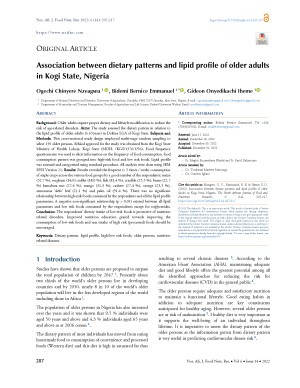Main Article Content
Association between dietary patterns and lipid profile of older adults in Kogi State, Nigeria
Abstract
Background: Older adults require proper dietary and lifestyle modification to reduce the risk of age-related disorders. Aims: The study assessed the dietary pattern in relation to the lipid profile of older adults (≥ 65years) in Dekina LGA of Kogi State. Subjects and Methods: This cross-sectional study design employed multi-stage random sampling to select 150 older persons. Ethical approval for the study was obtained from the Kogi State Ministry of Health Lokoja, Kogi State (MOH. /KGS/1376/1/96). Food frequency questionnaire was used to elicit information on the frequency of food consumption, food consumption pattern was grouped into high-risk food and low risk foods. Lipid profile was assessed and categorized using standard procedure. All analysis were done using IBM SPSS Version 21. Results: Results revealed the frequent (> 5 times / week) consumption of staple crops across the various food groups by a good number of the respondents; maize (52.7 %), sorghum (34.0), millet (38.0 %), fish (81.4 %), crayfish (25.5 %), beans (22.7 %) bamabara nut (27.4 %), mango (31.3 %), cashew (27.4 %), orange (23.3 %), amarantus ‘alefo’ leaf (22.1 %) and palm oil (91.4 %). There was no significant relationship between high-risk foods consumed by the respondents and all the lipid profile parameters. A negative non-significant relationship (p > 0.01) existed between all lipid parameters and low risk foods consumed by the respondents except for triglycerides. Conclusion: The respondents’ dietary intake of low-risk foods is protective of nutrition related disorders. Improved nutrition education geared towards improving the consumption of low-risk foods and rear intake of high risk (processed) foods should be encouraged.





